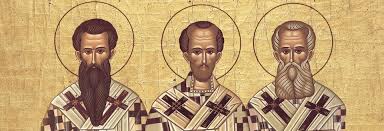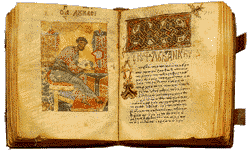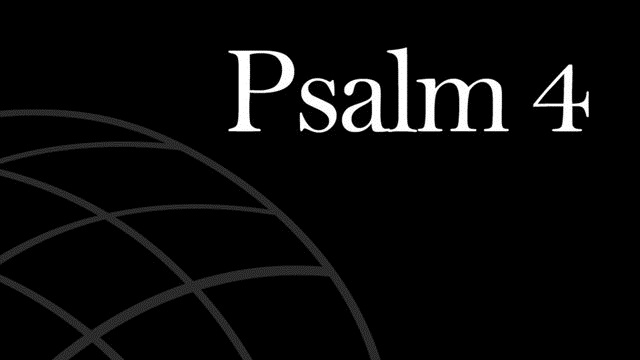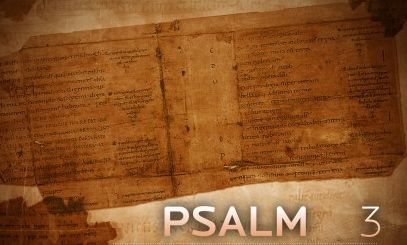 For it must be said in general that the apostolic fathers are not men of brilliance or penetrating theological insight; rather, their central contribution lies not in their elaboration of the faith but in their call for obedience to the ecclesiastical hierarchy, their warnings against heresy, and their simple commendation of the faith, even in the face of martyrdom. There is no doubt that a man like Polycarp, for example, was a great Christian leader and a great man of faith, but a great theologian he was not.
For it must be said in general that the apostolic fathers are not men of brilliance or penetrating theological insight; rather, their central contribution lies not in their elaboration of the faith but in their call for obedience to the ecclesiastical hierarchy, their warnings against heresy, and their simple commendation of the faith, even in the face of martyrdom. There is no doubt that a man like Polycarp, for example, was a great Christian leader and a great man of faith, but a great theologian he was not.
(Gary Badcock, Light of Truth and Fire of Love: A Theology of the Holy Spirit, 36)
Tag Archives: Leadership
Socrates, Nestorius, and the “Hard Work” of Theology
 The ancient church historian and contemporary of Nestorius, Socrates of Constantinople, evidently did not think much of Nestorius, despite his defence of Nestorius’s orthodoxy.
The ancient church historian and contemporary of Nestorius, Socrates of Constantinople, evidently did not think much of Nestorius, despite his defence of Nestorius’s orthodoxy.
What sort of a disposition he was of in other respects, those who possessed any discernment were able to perceive from his first sermon. … [those] did not fail to detect his levity of mind, and violent and vainglorious temperament, inasmuch as he had burst forth into such vehemence without being able to contain himself for even the shortest space of time; and to use the proverbial phrase, “before he had tasted the water of the city,” showed himself a furious persecutor.[1]
Nestorius had been appointed as bishop of Constantinople by the Emperor in 428AD, chosen for his “excellent voice and fluency of speech.” Nevertheless it seems controversy dogged his episcopate from the start, and he eventually was condemned for his christological views at the Council of Ephesus in 431. It seems Socrates believes this was an unfair judgement:
Having myself perused the writings of Nestorius, I have found him an unlearned man and shall candidly express the conviction of my own mind concerning him; … I cannot then concede that he was either a follower of [known heretics] Paul of Samosata or of Photinus, or that he denied the divinity of Christ … He does not assert Christ to be a mere man, as Photinus did or Paul of Samosata, his own published homilies fully demonstrate. In these discourses he nowhere destroys the proper personality (hypostasis) of the Word of God; but on the contrary invariably maintains that he has an essential and distinct personality and existence. Nor does he ever deny his subsistence… Such in fact I find Nestorius, both from having myself read his own works, and from the assurances of his admirers. But this idle contention of his has produced no slight ferment in the religious world (171).
How was it, then, that this gifted and charismatic speaker occupying one of the most prestigious pulpits in the empire caused such an uproar? Socrates is blunt:
He seemed scared of the term Theotocos [sic; i.e. “God-bearer,” or “mother of God”], as though it were some terrible phantom. The fact is, the causeless alarm he manifested on this subject just exposed his extreme ignorance: for being a man of natural fluency as a speaker, he was considered well educated, but in reality he was disgracefully illiterate. In fact he contemned the drudgery of an accurate examination of the ancient expositors; and, puffed up with his readiness of expression, he did not give his attention to the ancients, but thought himself the greatest of all (171).
Alister McGrath translates that last sentence: “In fact he had no time for the hard work which an accurate examination of the ancient expositors would have involved…”[2]
Theological work can be hard. Yet this observation from the early fifth century is just as relevant today. Some pastors, leaders, teachers and others rely on their excellent gifts, charisma and charm to carry their ministry, dismissing the work of those who have gone before as though it were of no value or benefit. In their pride they may become arrogant, and may even, as Nestorius did, cause great dissention in the body of Christ. The work may be difficult, may even be “drudgery,” but it is necessary work, especially for those charged with the responsibility of shepherding the people of God.
*****
[1] Scholasticus, Socrates, “The Ecclesiastical History of Socrates Scholasticus,” in Nicene and Post-Nicene Fathers (Second Series) Volume 2: Socrates, Sozomenos: Church Histories ed. Schaff, Philip & Henry Wace, (Peabody, Mass.: Hendrickson, 1890; reprint, 1995), 169.
[2] McGrath, Alister E., ed. The Christian Theology Reader, Third ed. (Oxford: Blackwell, 2007), 273, emphasis added.
Scripture on Sunday – Proverbs 31:1-9
 Proverbs 31:1-9
Proverbs 31:1-9
The words of King Lemuel, the oracle which his mother taught him:
What, O my son?
And what, O son of my womb?
And what, O son of my vows?
Do not give your strength to women, or your ways to that which destroys kings.
It is not for kings, O Lemuel, it is not for kings to drink wine,
Or for rulers to desire strong drink, for they will drink and forget what is decreed, and pervert the rights of the afflicted.
Give strong drink to him who is perishing, and wine to him whose life is bitter. Let him drink and forget his poverty and remember his trouble no more.
Open your mouth for the mute, for the rights of all the unfortunate. Open your mouth, judge righteously, and defend the rights of the afflicted and needy (NASB).
Although we cannot be sure whether any women authored books or passages of Scripture, there are a number of texts in Scripture attributed to women, including this one. King Lemuel is otherwise unknown to us, although Murphy suggests that he was king of “Massa,” understood as an area in northern Arabia (Murphy, Proverbs (WBC), 239). He bases this conjecture on a possible translation of the word “oracle” as Massa. The name itself, however, is a Hebrew word meaning “belonging to God” (Kidner, Proverbs (TOTC), 182). The passage has a number of similarities with other wisdom texts from the Ancient Near East, and even includes Aramaic words and idioms. Nevertheless, Murphy (240) notes that this is the only instance in such literature where the king is instructed by his mother. In the end he considers the oracle to be a Hebrew composition.
It is tempting to suggest that the passage is about “wine, women, and song,” although there is no mention of indulging in the pleasures of music. Nevertheless, the king is instructed to “open his mouth!” Of wine and women, however, there is firm, blunt instruction, though the order is reversed. The mother offers this counsel on the basis of her maternal authority: he has come forth from her womb, having received his life from her. Further, he is the “son of my vows,” perhaps reminiscent of the promise Hannah made with respect to Samuel (cf. 1 Samuel 1:11, 28).
“Give not your strength to women, or your ways to that which destroys kings!” The admonition is more a warning against promiscuity than an assertion of the supposed wickedness of women. Kings often have the resources to indulge their desires in ways not available to poorer, less powerful folk. Nor is it for the king to indulge in wine and other strong drink lest he forgets the decrees and perverts the rights of the afflicted. Whereas the king is not to drink and forget, he should give strong drink to the afflicted that they may drink and forget – their afflictions and poverty. This, too, is unusual advice, especially in light of a text like Proverbs 20:1, a strident repudiation of strong drink and drunkenness (cf. 23:20-21, 29-35). Perhaps it is best to let verse 6 set the scenario: “Give strong drink to him who is perishing,” and so see the advice in terms of administering a palliative or an analgesic.
Finally, the mother counsels her son to open his mouth for the mute, for the rights of the dispossessed, afflicted, vulnerable and needy. Rather than forget their rights, he is to enter the fray on their behalf, defending their rights and upholding their cause.
A number of themes in this short passage deserve reflection.
- Some things are wrong, bad and evil for anyone, but especially for those charged with leadership or who hold the reins of power, justice or influence. Self-indulgence eviscerates moral awareness, courage and determination. Drunkenness, sexual laxity and other self-indulgent pursuits cause one to centre in on themselves and to forget their responsibilities, and sometimes, all else. These things destroy leaders, cause them to become oppressors, and tear at the very fabric of trust that binds the relationship of leader and followers.
- Murphy translates verse three as “Do not give your strength to women, or your power to those who destroy kings.” Many of us have been granted a measure of strength or power, often in different spheres of endeavour or responsibility, and we can use that power to indulge ourselves and satisfy our own desires, or we can use it to help, benefit and bless others around us. Instead of spending it on himself, the king is admonished to preserve and direct his strength for the sake of the mute and the vulnerable. He is to remember the “decrees,” the sacred trust granted to him as king, as a leader, as one given power and influence. He is to serve others rather than himself, and not simply any others, but the poor and defenceless, those who have no other helper, and those who cannot repay him with favours.
- The primary service the king is to render is to “open his mouth” for the mute (vv. 8, 9). According to Murphy, “the ‘mute’ are not so much physically as they are socially weak, without a voice among those who administer justice” (241). I find this one particularly challenging. Too often, I think, I have not spoken up when I could and should have done so. Larry Crabb entitled one of his books “The Silence of Adam,” arguing that Adam stayed silent when he should have spoken up. He suggests this a sin that befalls many men particularly. It is true there is a time to be silent, but there are also times where to be silent is to add affliction to those already suffering. I must remember to “open my mouth for the mute.”
- It is not uncommon to hear that the language of “rights” emerged in western culture with the Enlightenment. Although there may be some truth in that, this passage is a clear biblical example of rights language, though in Scripture it applies to the “rights” of the vulnerable, afflicted and needy. It is not at all unusual in our culture for the powerful to stand up for their rights. Again, this passage calls us to stand up for others’ rights.
- Finally, I have sometimes tried to imagine a world in which women held the offices and reins of power instead of men. Would such a world be different to what it often is now? Certainly women are sinful just as men are. But would a world ordered by women be as given to violence as it is now? Would abuse and oppression be so widespread? Perhaps. Lord Acton’s famous dictum probably applies to women as much as it does to men although it seems he had men specifically in mind: “Power tends to corrupt, and absolute power corrupts absolutely. Great men are almost always bad men.” But the words of this passage originated as the counsel of a woman, a mother using her power and influence to train her son who one day would be king. May her tribe increase.
Scripture on Sunday – James 1:1
 James 1:1
James 1:1
James, a bond-servant of God and of the Lord Jesus Christ, to the twelve tribes who are dispersed abroad: Greetings.
The first word of the letter is simply the author’s name, following the custom of ancient letter writing practices. This James is apparently so well known that he can be recognised simply by mention of his name. There are really only two “Jameses” in the New Testament who are sufficiently prominent to qualify as this James: James the brother of John, one of the twelve, who was martyred by Herod (see Acts 12:2), and James the brother of Jesus, who became leader of the church in Jerusalem. Last week we suggested that the latter is best thought of as the writer.
But James does not set forth his privileged relationship to Jesus as the basis of his right to gain the attention and hearing of his audience, but refers to himself rather as a “bond-servant (doulos) of God and of the Lord Jesus Christ.” To claim to be a servant of God is not uncommon within Judaism, but to claim also to be a servant of the Lord Jesus Christ is to immediately distinguish oneself from mainstream Judaism, indicated by assigning these particular titles—Lord and Christ—to this particular man. Christos (Christ), is simply the Greek rendering of the Hebrew term for Messiah, while kyrios (Lord) is the Greek term used in the Septuagint to translate the Tetragrammaton (YHWH)—the holy name of the Lord God. To refer to the man Jesus as Lord and Christ is to associate him with the Old Testament God, and as God’s eschatological saviour, the Messiah. This, of course, constitutes a decisive claim within Judaism: the Messiah has come! God has acted to redeem his people. His eschatological salvation has appeared amongst the human community, precisely in this particular man, Jesus, whom we must also acknowledge as Lord.
James addresses his letter “to the twelve tribes who are dispersed abroad.” This is unusual language because technically, the twelve tribes no longer exist, the northern kingdom of Israel having been taken into captivity by Assyria many centuries earlier (see 2 Kings 17). It is likely that James is using the phrase simply to identify ethnic Jews, and perhaps more particularly, Jewish believers in Jesus “who are dispersed abroad” (tais en tē diaspora). The noun diaspora referred to those Jews who lived outside of Palestine; the term was both ethnic and geographical (Trebilco, 287, 297-299). If we accept that the epistle was written by James the brother of Jesus sometime in the 40s, it could be that he is writing especially to those Jewish believers who had been part of the Jerusalem congregation, but then had been “scattered throughout” the regions of Judea and Samaria in the persecution that arose after the stoning of Stephen (Acts 8:2, 4). Indeed, Acts 11:19 tells of some of those “scattered” who went to the gentile regions of Phoenicia, Cyprus and Antioch. In each of these texts the verb used is diaspeirō, the cognate of the noun used in James 1:1 (and the only times the verbal form occurs in the New Testament). By means of his letter, James is extending pastoral care and oversight to these followers of Jesus in their scattered locations, who, as former members of the Jerusalem community, would have been aware of James’ identity, leadership and authority.
Might James have had an evangelistic as well as a pastoral motive for writing this letter? Might he be writing to Jews more generally who are now being brought into contact with Christian Jews, and encouraging them to believe in Christ? This is unlikely, given the very few references to Jesus in the letter. James is writing to exhort Christian Jews to faithful endurance in the midst of their suffering and hardship, and to perhaps to counter reports he has heard concerning disunity in their midst.
“Greetings!” James’ salutation is to the point. This form of salutation is found elsewhere in the New Testament only in Acts 15:23—in the letter from the council of Jerusalem. But it is a common form of greeting in Greek letters, which also indicates James’ familiarity with the Greek style (Moo, 58). The word itself—charein—literally means “to rejoice” and thus also forms a fitting segue to the next verse.
Application
Though a simple salutation, this verse lends itself to at least a couple of applications for Christian life and ministry. First, James could have introduced himself as the brother of Jesus, claiming elevated rank, privilege and authority. But James does not “pull rank” on his readers choosing rather to describe himself simply as a servant. This is consonant with Jesus’ teaching that those who would be great in the kingdom of God must take the lower place, becoming servants and following his own example: “for even the Son of Man did not come to be served, but to serve, and to give His life a ransom for many” (see Mark 10:42-45; cf. John 13:1-17). Further, it is fitting: if Jesus is the Lord-Christ, the Messiah-King (McKnight), then to be his servant is in itself a high and distinguished calling.
Second, James is concerned not simply for the believers surrounding him, those he can see, but for those who have been scattered, those under pressure, those who have left, and those far away. Out of sight is not out of mind for James the Just. Undoubtedly the prayerful man prays for them; here he writes to make contact, to encourage and exhort. Pastoral authority is grounded in pastoral care, pastoral leadership in humble service.
An Ethics of Presence & Virtue (Psalms 9-11) Pt 2
 In Sunday’s post I suggested that Psalms 9-11 generate a moral vision for the people of God. What, then, might this positive vision of life look like?
In Sunday’s post I suggested that Psalms 9-11 generate a moral vision for the people of God. What, then, might this positive vision of life look like?
1) It will be a life in community, the life of the people of God, rather than isolated individuals. Although David seems to stand alone against the wish of his interlocutors, David was not alone, and one can be sure that his leadership in this matter would stimulate a corresponding response in others. Further, the very psalms themselves testify to a community that kept this vision alive and embodied their hope.
2) It will be a life deeply grounded in the knowledge of God and vision of hope that emerges from the Old and New Testaments. It is clear that the faith, hope and worldview that come to expression in these psalms is grounded in the revelation of God given in the scriptures of the Hebrew people.
3) It will be life that finds expression in worship and praise, prayer and trust, faith and obedience, that is, in the acknowledgement of this God who is sovereign over all, who will judge the wicked and reward the righteous. The form of life called forth by these psalms will be grounded, nurtured and supported in this community of faithful worship and devotion. In particular, the community and those in it will pray as the psalmist prays, crying out for God to arise, praying Thy Kingdom come!
4) It will be a life in which particular virtues are evident: we have already mentioned faith and hope. These in turn generate patience and courage. Patience refers to that steadfastness that waits for God’s action, which refuses to capitulate to despair, faithlessness or godlessness. It is the concrete expression of hope and is oriented toward that hope. The courage in these psalms springs from the faith-conviction that God reigns and will indeed establish his justice. Therefore the psalmist has courage to stay, despite personal threats and dangerous conditions.
Other virtues are evident in these psalms. If God loves justice his people will aspire to live justly. If God cares for the vulnerable and shelters the oppressed, so his people will learn to emulate God’s compassion for those suffering and afflicted by the conditions of the world. Over against the pride, greed and violence of the wicked, God’s people will value humility, contentment, gentleness and peace.
5) It will be a life of presence in the midst of the society. Through faith, David stays. The community of God’s people will be present to the vulnerable and afflicted, ministering to them and in solidarity with them. They will also be present to the wicked as a testimony against their ways. In both cases they serve as a witness to the present and coming kingdom. They not only pray Thy Kingdom come! but live the ways of the kingdom in the midst of world.
In the early years of his career Karl Barth adopted the language of 2 Peter 3:12 as a watchword for his understanding of the nature of Christian life: “waiting for and hastening the coming day of God…” These psalms bear a similar testimony. The church fervently prays Arise O God, Thy Kingdom come! and therefore waits in anticipation of a new heavens and earth in which righteousness dwells. In the meantime, however, they hasten towards and bear witness to that coming kingdom by practicing righteousness here and now. They practice an ethic of resistance and non-participation with respect to the ways of “the nations” and instead live gently, humbly and generously in a world of violence, pride and greed. Theirs is a spirituality of faith, hope and love, and an ethics of presence and virtue, and all this in the community of God’s people.
A Psalm for Sunday – Psalm 11
Although only seven short verses, this psalm speaks powerfully to those facing crises or danger, for it was written in response to some kind of threat and danger. “In the Lord I take refuge; How can you say to my soul, ‘Flee as a bird to your mountain’” (v. 1).
We cannot know who this person or these people are who counsel flight, although we get some reason as to why they do so in verses two and three: the very foundations of society are being destroyed, and the wicked seem to be in the ascendancy. Although they slink about in darkness, they are armed and ready to shoot at the upright and bring them down. It seems there is nothing the upright can do in these circumstances except flee. Perhaps the counsel to flee comes from those concerned for the welfare of the psalmist. Perhaps it comes as a cynical admonition from those who sneer at his faith and think his defeat is imminent and irreversible. Either way, it is the counsel of despair: “Give up! Flee! Take cover! Save yourself; run for your life; seek safety elsewhere and let the city go to the dogs: there is nothing you can do.”
This is precisely what the psalmist refuses to do: “In the Lord I take refuge.” This bold statement recalls the promise of 2:12 that those who seek refuge in the Lord shall be blessed, even if the nations rage, and the “man of the earth” continues to enact terror (10:18).
What can the psalmist see that his counsellors cannot? “The Lord is in his holy temple; the Lord’s throne is in heaven” (v. 4). The psalmist is convinced that God is still on the throne, that God reigns, and so the events of earth are not beyond divine sovereignty and providence. God is neither absent nor uninvolved, but tests humanity, weighing the deeds both of the righteous and the wicked. Further, the psalmist believes that God exercises judgement, punishing the wicked and rewarding the righteous (vv. 6-7). This judgement is still future for the psalmist, but it is not necessarily eschatological (a judgement beyond the grave), but may in fact be historical. The wicked will in this life get their “just deserts,” while the righteous will receive God’s favour and be vindicated (cf. Craigie). It is possible, however, that the final phrase of the psalm, “the upright will behold his face,” may be understood in terms of the beatific vision promised to God’s people in the New Testament (see, for example, Revelation 22: 4).
Ultimately, then, the psalmist’s confidence is based upon faith. He trusts God because he trusts that the reality of God is more sure and more certain than the disintegrating chaos that surrounds him. This faith has several crucial aspects, which reflect the theological worldview of the ancient Hebrew people:
- First, God is utterly supreme, the transcendent ruler, lord and judge of all humanity;
- This God is moral, dwelling in his holy temple; he loves righteousness and so hates the one who loves violence (v. 5). The moral nature of God undergirds his activity as judge;
- In contrast to God, humanity is morally corrupt, and remains accountable to God who tests all people (vv. 4-5). Yet the possibility of being found among the righteous remains, and those who trust in God and practise righteousness will find that they are sheltered by God, and will “see” God’s face (v. 7);
- Judgement is certain, and there is a firm hope that ultimately, justice will be done, with the righteous being vindicated and blessed;
- How did the ancient Israelites know all this? By a conviction that this God had revealed himself to Israel throughout her history, and had called Israel into a covenant relationship with God. This knowledge and hope, assurance, courage, and moral vision are grounded in God’s revelation of himself and his will to his elect people.
The central question of the psalm is that put to the psalmist in verse three: if the foundations are destroyed, what can the righteous do? The psalmist seems to ignore the question, and instead directs his attention to the Lord who is in his holy temple (v. 4). Craigie (133) notes that this hints at the immanence of God: God is not simply transcendent and sovereignly powerful, but also present to comfort, help and support. There is no dualism here, no division of heaven and earth into separate compartments and spheres of rule. God’s throne is in heaven; God dwells in his temple. The same God is lord over all things, sovereignly powerful and yet close enough to shelter those who trust in him.
But is the psalmist evading the question? Perhaps not. For the psalmist, the Lord himself is the true foundation, the only foundation, an indestructible foundation upon which he can build his life and in whom he can trust. Social and cultural foundations may falter, people fail, institutions fade, and civilisations fall, but God remains steadfast. God himself and God alone is our only foundation—an unseen and intangible foundation, but no less real for all that.
What can the righteous do? They can do what the psalmist did: trust more deeply in God, and refuse to abandon their post. If we assume Davidic authorship of the psalm, we find here a leadership that refuses to capitulate in the face of desperate crisis. We find here a righteousness that refuses to hand over the city to the wicked. We find here a profound vision of faith in the sovereign goodness, presence and power of God—the true foundation upon which a life, a leader, and a city may be built. David stays because David trusts.
A Psalm for Sunday Psalm 4
Read Psalm 4
 If Psalm 3 is a morning prayer, Psalm 4 can be read as an evening prayer. Further, just as Psalm 3 provides some insight into David the leader, so Psalm 4 does likewise, if Davidic authorship is accepted. In some sense, then, these two psalms may be read together, and perhaps, have been brought together in the Psalter for this reason.
If Psalm 3 is a morning prayer, Psalm 4 can be read as an evening prayer. Further, just as Psalm 3 provides some insight into David the leader, so Psalm 4 does likewise, if Davidic authorship is accepted. In some sense, then, these two psalms may be read together, and perhaps, have been brought together in the Psalter for this reason.
The first verse opens the psalm with a passion-filled fourfold petition. Most English versions render the second phrase as “You have given me relief.” There is some scholarly debate about the correct interpretation of the Hebrew verb here, and Craigie translates the phrase as, “When I am in distress, give me room.” This seems to fit the verse better than the English translations which place a confession of relief in the midst of two desperate pleas. In Craigie’s translation, the whole verse is one sustained cry to God for help. In fact, it is stronger than that; the psalmist is telling God what to do: Answer me! Give me room! Be gracious to me! Hear my prayer!
What has happened to arouse this desperate cry to God? Some indication of David’s circumstances is found in verses 2 and 6a: David’s reputation is under assault, his leadership is questioned, his honour has been turned into shame. Although we do not know exactly what has occasioned this reversal of his fortunes leading to humiliation, some scholars suggest that the nation is facing difficulties and David is being blamed. Lies, vain words and empty rumours circulate. Indeed many are saying, “Who will show us some good?” Perhaps God’s goodness has departed and they want to see the leader replaced. Politics has not changed much over the millennia!
In the face of this trouble and false accusation David protests his innocence: “Answer me when I call, O God of my right.” He reminds himself—and his accusers—of the Lord’s protection. Verse 3 is beautiful: “But know that the Lord has set apart the godly for himself; the Lord hears when I call to him.” David’s confidence is not grounded in himself, his strategic ability, his military prowess, or anything else belonging to him. His confidence is confidence in God, confidence grounded in God’s call and God’s faithfulness. The God who called and anointed him will also sustain and keep him.
Verses 2-5 are unusual, as though addressed to his opponents, even as they are being spoken to God in the midst of his prayer. Perhaps David is “processing” his stress in prayer to God. Perhaps he is formulating his response to his accusers in this environment of prayer. In any case he counsels his opponents:
- Stop listening to lies and empty words;
- If you are angry – do not sin! Search your own heart, keep quiet. The moment your anger leaks out in words or actions you sin against the innocent;
- Rather, offer right sacrifices to God and return to your trust in God;
- Remember: the Lord sets apart the godly for himself, and listens to me when I call to him.
In 6b David returns to petition, echoing the words of the priestly blessing in Numbers 6:26: “Let the light of your face shine upon us, O Lord!” (Compare also verse 1: “Be gracious to me!”) David is still telling God what to do! Craigie sees the petition continuing in verse 7 which he translates as “Put more joy in my heart…” It is worth noting that David is not praying for the destruction of these enemies, or for his own vindication. He prays rather that the light of God’s presence might shine upon all, and that his heart would be filled with joy. In so doing he comes to a place of peace and, trusting in God’s protection, is able to lie down to sleep (verse 8).
*****
Being the object of blame is difficult enough when we are in fact blameworthy; suffering blame and false accusation when we are in fact innocent of the charges is hurtful, stressful and demoralising. Faced with such distressing circumstances, the psalmist prays through to a place of peace.
Prays through. Now that is the language of old-timers in the faith! It refers to the persistence in prayer that holds fast to the biblical promises, which wrestles with all the fears, anxieties and doubts that are faced, until one-by-one they are brought under the reign of God’s peace. In this psalm David’s prayer is both urgent and bold. Whence cometh this kind of boldness in prayer that dares to tell God what to do? What is the difference between this boldness in prayer and an unholy arrogance that presumes to tell God what to do?
David’s boldness is born of a long association with God in prayer, devotion and worship, and apart from this association could be nothing but presumption. There is a knowledge of God which comes through study; there is also a knowledge of God which grows through association, fellowship, obedience, and interaction. David knew the Lord, trusted God, relied on his promise in Scripture, claimed it and prayed it, and rested in the faithfulness of the God who had called, chosen and set him apart. Sure that he was in the Lord’s safe-keeping, he laid down in peace and slept. The prayer has not—yet!—made any discernible difference to his circumstances—in the morning all the enemies will still be there. But having brought his concerns and processed his stress in prayer, David goes to sleep a peaceful man.
Psalm 3 for Leaders
Read Psalm 3 and 2 Samuel 15:13-37
and 2 Samuel 15:13-37
I wrote a short exposition of this psalm and its historical setting for yesterday’s post. There we noted that this is a devotional psalm, a morning prayer to entrust ourselves and our day to God in faith, trust and commitment. But there remains more to be said.
We noted the possibility that David sent the ark back to Jerusalem because he refused to presume on God’s grace and call, or to co-opt God for his own cause. Hidden in this narrative is a lesson for leaders, for Christian leaders are continually tempted to presume on the legitimacy and righteousness of their cause. Humbled, David allowed God to establish his position and cause – on this occasion, at least.
Yet David also obviously believed in God’s grace, and believed that God’s presence was with him even without the ark, and even in spite of the sin which had brought such terrible consequences into his life and family. When all around suggested that God had abandoned him, David continued to trust.
The narrative in 2 Samuel indicates that one of the means by which the Lord sustained David was via the great grace of faithful companions – not everyone around him was an enemy, and these friends could not help but be a means of support and encouragement for David.
David also acted, taking pragmatic steps in addition to his prayer. In 2 Samuel 15:31 David prayed that the Lord would turn the counsel of Ahithophel into foolishness. In verse 34 he sent his servant Hushai as a spy to thwart the counsel of Ahithophel. David’s act is not a sign of lack of trust in the God toward whom he had just prayed. Prayer often gives rise to corresponding action; divine wisdom often supplies a strategy. Salvation is of the Lord, but God often uses various means to accomplish his purpose or answer our prayers.
“The horse is prepared for the day of battle, but victory belongs to the Lord” (Proverbs 21:31). This proverb, echoing the words of the psalm, shows that faith is not simply passive or inactive; a person of faith prays and trusts, and on the basis of that prayer and trust also works, the works being the fruit and evidence of the faith. Without divine grace and help, without the divine presence and blessing, there can be no victory, no matter how well dressed the horse and rider are. Nevertheless, although victory is of the Lord, there are still preparations to be made.
So in the morning we awake and we pray, calling upon the Lord for his help, protection, guidance and blessing, committing our day and our very life into his care, in accordance with his purpose. And then we go to work, trusting in the One to whom we have prayed, who also is our shield and salvation, our glory, and the lifter of our head.
